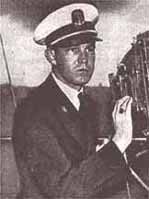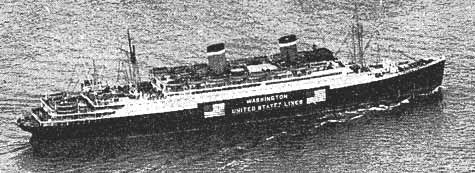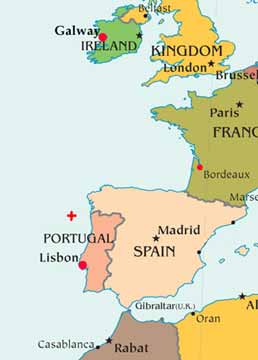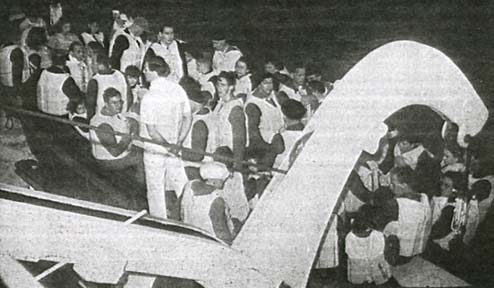Ten minutes to abandon ship! SS Washington in Stand-Off With U-Boat!
On September 3, 1939 a few hours after Britain declared war on Germany, the SS Athenia, a British passenger ship, was torpedoed by U-30. Among the 1,302 on board were more than 300 Americans hurrying home. 118 passengers and crew were killed in the initial explosion or died later as a result of the sinking. The Battle of the Atlantic had begun.
Fritz Lemp, Commander of U-30, mistook the SS Athenia for an Armed Merchant Cruiser, and fired 3 torpedoes before he realized his mistake. Germany denied all knowledge of the incident and claimed the British had torpedoed the ship themselves in an attempt to involve the United States in the war. (The sinking of the British passenger ship Lusitania during World War I, with heavy loss of life, led to international rules of war which protected passenger ships from attack.)
During the late 1930's, the finest and fastest American passenger liners were sister ships SS Washington and SS Manhattan, operated by United States Lines. Built in 1932-3 by New York Shipbuilding (Camden, New Jersey), they were 24,000 gross tons, 705 feet overall length, 86 foot beam, and 30 foot draft. Twin turbines provided a top speed of 21.5 knots. They competed in the trans-Atlantic trade with the much larger and faster Queen Mary, Queen Elizabeth, Ile de France, Normandie, Rex, Bremen, and Europa.
SS Washington upon arrival in New York. American flags,
"Washington" "United States Lines" are clearly marked on her sides.When war broke out, normal passenger service ended, and American-flag ships evacuated Americans from ports in neutral European countries.
On June 1, 1940, the Washington Post reported that according to the U.S. State Department, Americans who missed the SS Manhattan at Genoa on June 2, should travel to Bordeaux to board the SS Washington. According to the article, "notices had been sent to all the belligerent governments, cautioning them not to molest or delay the SS Washington... the ship was not carrying passengers, cargo or mail... excepting two Red Cross Representatives and a shipment of Red Cross medical supplies... and with the American flag prominently displayed and fully lighted at night."
By June 11, 1940, The Netherlands, Belgium and Norway had fallen to the German invaders. Nazi troops were outside Paris.
On the morning of June 11, 1940, a German submarine stopped the SS Washington and signaled "10 minutes to abandon ship." With 1,020 passengers and 570 crew on board, the tragedies of the SS Athenia and Lusitania were foremost on Captain Harry Manning's mind.
+ off Portugal marks the location where the
U-boat stopped the SS WashingtonAccording to Captain Harry Manning, this is what happened [excerpts]:
It was on the next to the last refugee return trip from Europe made by the SS Washington last June, bound from Lisbon [Portugal] to Galway [Ireland].
Before departing from Lisbon I had visited the British Consular Shipping Office for the latest war information and data concerning the safest route.
I took particular pains to tell the American Minister of the route I intended to follow in order that he might advise all belligerents that a neutral ship on a nonmilitary voyage was proceeding on that course under the American Flag. The information I received from the British officials indicated that there were no submarines operating outside of the wide arc 180 miles off the coast, which I laid down as a safe course.
Curiously enough, as we cast off from Lisbon my mind went back 26 years to the last European War when I had my first experience carrying American refugees from a war-worried Europe. I was then a cadet on the USS Newport, of the New York State Nautical School.
USS Newport at right
We were on a cruise to the Mediterranean when the storm broke and left stranded Americans gasping for aid. The fine foreign ships on which they had sailed to Europe canceled all sailings in order to pursue their war-time missions.
There was an ironic twist to the situation; many of the group rescued on that occasion were members of a large party that had traveled to France, to celebrate the launching of a large passenger ship, as the guests of a foreign steamship company. They were very indignant when they found no American ships to take them home, and in angry desperation appealed to the commanding officer of the Newport for passage.
They came aboard at Marseilles. It was close quarters for them crowded in the cabin and in several rooms vacated by the officers. We made a voyage around the Mediterranean Sea seeking provisions, and, after many futile calls, we were finally able to provision at Genoa. Coal was piled on deck and we sailed most of the way in order to conserve the precious fuel. [USS Newport had a triple expansion steam engine in addition to her sails.]
When the ship arrived at Providence, Rhode Island, after a 7-knot voyage with the sea-sickened refugees, we were received in state by the Governor. All hands received medals for saving such valuable citizens.
Vastly different in some respects, but much alike in others, was this refugee trip. The accommodations were "palatial" compared to those available on the little Newport. The Washington had about 35 times the displacement with nearly 4 times the speed of the little barkentine gunboat.
But there was one point of similarity; most of our passengers were making their first trip in an American ship. One of the impediments to the success of the American Merchant Marine is that many traveling Americans seek passage in their own nation's ships only in such times of stress.
All went well on our trip. June 11, at five in the morning, when we were 180 miles from the Portuguese coast the black night gloom of the just-before-daylight darkness was pierced by the spitting gleam of a blinker from a submarine with an urgent order to "stop, heave to." [Surprisingly, all messages from the U-boat were in English!]
We quickly obeyed.
The dread "torpedo the ship" was flashed, followed by the demand to abandon the ship in 10 minutes.
Watertight doors were closed, the general alarm was sounded, and the operation of stowing the passengers in the boats consummated with commendable calm and lack of confusion. Not a passenger showed signs of hysteria or confusion. The crew behaved well, obeying orders without question or criticism. Women and children went first. We maintained radio silence.
While the boat loading was in progress I kept Cadet William O'Reilly, who manned our blinker, flashing out continued appeals to reason.
"American," "Washington," was flashed continuously.
 |
 |
| Capt.
Harry Manning |
Cadet William O'Reilly
at the blinker |
I wanted to convince the submarine commander by blinker that he was in error in assuming that we were a belligerent craft or to keep talking until the break of dawn revealed it to his own eyes.
It was ticklish. I know how "trigger itch" will work in such a case and how an overenthusiastic young officer might be anxious to sink such a fat prize, as we indubitably appeared magnified by the gloom.
Apparently the submarine commander had trouble understanding what we said -- translating it from a book letter by letter -- as we sent the signals.
Fearful of a false move that would loose a nervous torpedo, I had O'Reilly stick to the simple formula, "American Ship," over and over again.
"Ten Minutes" came back out of the lightening gloom.
All this time the finishing touches were being perfected in making the ship as watertight and stable as possible so that, even if she were torpedoed, there might be some hope of keeping her afloat.
"... we sped away at full speed for half an hour.
The passengers remained in the boats as a precaution..."If only the light would reveal the dramatic appeal of the helpless women and little children crowded in the boats, it would melt the heart of the hardest, as it was a pitiful sight.
Then a dark and ominous silence from the submarine for a short, in time, but eternity of anxiety ensued. The minutes ticked off to the fateful ten and past.
We held our breath on the bridge and waited the blast that would announce the doom of the finest ship under the American Flag. I was about to have the engine and firerooms secured when out flashed the blessed:
"Thought you were another ship; please go on, go on!"
Daylight had arrived and it was 6:00 AM.; one hour, that seemed a lifetime, was consumed in the incident.
I cannot understand how an experienced submarine commander could have made the mistake as the ship was fully illuminated and the second funnel fully flood lighted. A little later the German High Command admitted that a German submarine had made the mistake. [The U-Boat captain thought she was a Greek ship.]
After the release was given, the Washington was immediately headed into the rising sun, so as to obscure vision if our underseas friend should change his temporarily kind mind, and we sped away at full speed for half an hour.
The passengers remained in the boats as a precaution in case a less careful and considerate submarine was in the vicinity. We then stopped, passed the passengers aboard, and secured boats and ship in normal war cruising condition.
At 6:53 A.M. another undersea boat popped up several miles off on the port beam and rather than risk another encounter I swung the ship into the sun again which brought the unwelcome neighbor dead astern and steamed away. The submarine made no move, possibly the sun blinded him, and it soon disappeared astern.
We arrived safely at Galway [Ireland] the next day.
The SS Washington's normal passenger capacity was 1,083, but when she finally arrived in New York on June 21, 1940, she had 1,787 refugees aboard, including 700 children. Passengers slept with lifebelts under their pillows. They slept on cots in the Grand Salon, Palm Court, library, post office, swimming pool, and other public places. Infants slept in baskets. Bath water was rationed.
On June 12, the German government admitted one of their U-Boats had stopped the Washington, but stated official notification of her itinerary reached Berlin many hours after the incident. Germany was previously informed the SS Washington would stop at Lisbon and Bordeaux, but did not know she was bound for Galway. However, unofficial news of her new itinerary was printed in German newspapers the day before the incident.
According to Berlin:
"Following the usual exchange of greetings, the German commander allowed the Washington to pass without further hindrance."
Following is account of blinker messages exchanged by ship and submarine:
June 11, 1940. Time 0500
Latitude 42°-12" North-Longitude 12°-50" WestSS Washington stopped by unknown submarine.
Sub: "Stop ship."
Sub: "Heave to ship."
Sub: "Torpedo the ship."
Ship: "American ship."
Sub: "Captain has ten minutes to leave ship."
Ship: "American ship."
Sub: "Ten minutes."
Ship: "Washington American, Washington, Washington American," continuously.
Sub: Silent.
Sub: "Thought you were another ship, please go on, go on."
Ship: "Thanks."Resumed speed for half hour in direction of sun to get away from submarine.
0630 Secured stations. [Exited from lifeboats]
0653 Sighted another unknown submarine several miles off port side; course altered into sun with submarine dead astern. No exchange of messages between submarine and ship.
0715 Resumed course; submarine out of sight.
Commander expresses his appreciation of conduct of passengers and crew.
Medals and Bonus
United States Lines awarded a medal to each member of the crew, plus a 10% bonus of their montly pay. Captain Manning, John Gorman (Able-bodied Seaman, who tried to rescue a man overboard in Galway), and Tom Floyd (bellboy, who sighted the second submarine) received the company's Distinguished Service Medal.
Biography of Captain Harry Manning
Harry Manning, 43 years old at the time of this incident, graduated from the school ship USS Newport in 1914. He joined U.S. Lines in 1921 and became master in 1928. He was navigator and radio operator for Amelia Earhart on her first attempt to circle the globe, which set a record from San Diego to Hawaii, but crashed during take-off from Honolulu. Manning was the hero of several well-publicized rescues at sea during his career. During World War II, he served as Commandant of Huntington, Hoffman Island, and Avalon U.S. Maritime Service Training Stations. He was Master of the SS America on her maiden voyage and the SS Washington on her first trip after the war -- bringing war brides to the U.S. from Europe. The SS Washington served during the war as a U.S. Navy transport renamed the USS Mount Vernon.
Sources:
Manning, Harry. "Ten Minutes," U. S. Naval Institute Proceedings, November 1940
Driscoll, Lawrence. S.S. America - U.S.S. West Point - S. S. Australis: The Many Lives of a Great Ship. Benicia, CA: Glencannon Press Maritime Books, 2003
Farrington Jr., S. Kip, Ships of the U.S. Merchant Marine, New York: E. P. Dutton Inc. 1947
"Hands Off Refugee Ship, U.S. Warns. Belligerents Asked Not to Molest S.S. Washington." The Washington Post, June 1, 1940
"Sub Threatens To Sink U.S. Refugee Ship. Frantic Signaling Saves Her; Officials Here Indignant." The Washington Post, June 12, 1940
"Submarine Halts U.S. Refugee Liner. Unidentified Craft Threatens to Sink the Washington with 1,590 Aboard, but Relents." New York Times, June 12, 1940
Nazis Admit U-Boat Stopped U.S. Liner. Germans Profess Ignorance Washington Had Altered Her Course for Ireland. Failed To Receive Word. State Department Admits Instructions May Not Have Reached Berlin in Time." New York Times, June 13, 1940
"1,787 Who Fled War at 11th Hour here. The Washington Brings Them After Harrowing Encounter With Nazi Submarine." New York Times, June 22, 1940
"After Brush With U-Boast, Refugee Group Pleaded Against Halting of U.S. Liner at Eire for Others. 1,786 Including 700 Children, Land with Sirens Howling." The Washington Post, June 22, 1940
Washington's Crew Will Receive Medals. Also to Get Bonuses for Work in Submarine Scare." New York Times, June 27, 1940
"D.C. Woman Describes Scene As Submarine Menaced Liner." The Washington Post, June 23, 1940
"Who's Who?" The MAST. October 1945
Training Ships of the SUNY Maritime College USS Newport (1908-1931) http://maritimeindustrymuseum.org/ships.htm
SS Athenia http://members.iinet.net.au/~gduncan/maritime-1.html#maritime_disasters_1939
Map based on Perry-Castañeda Library Map Collection Political Map of the World http://www.lib.utexas.edu/maps/06/18/05
www.USMM.org ©1998-2007,. You may quote material on this web page as long as you cite American Merchant Marine at War, www.usmm.org as the source. You may not use more than a few lines without permission. If you see substantial portions of this page on the Internet or in published material please notify usmm.org @ comcast.net


